A visit to Manshiyat Naser, Cairo
There is one major obstacle taking the back streets in a walk to Manshiyat Naser: tea. At times it’s only a matter of minutes between the shouts of hearty fellows inviting you over to join them in another glass, that traditional measure of hospitality throughout so much of the world. My clumsy pronunciation of, “shukran, ana lissa shribt shai” (thanks I’ve just drunk tea) my only weapon to politely stave off the numerous calls to join small groups of men, happy to prove the Egyptian commitment to hospitality. Thankfully my bladder was having one of its more retentive days, so I could risk succumbing to the second call to tea within the first two hundred meters of Manshiyat Naser.
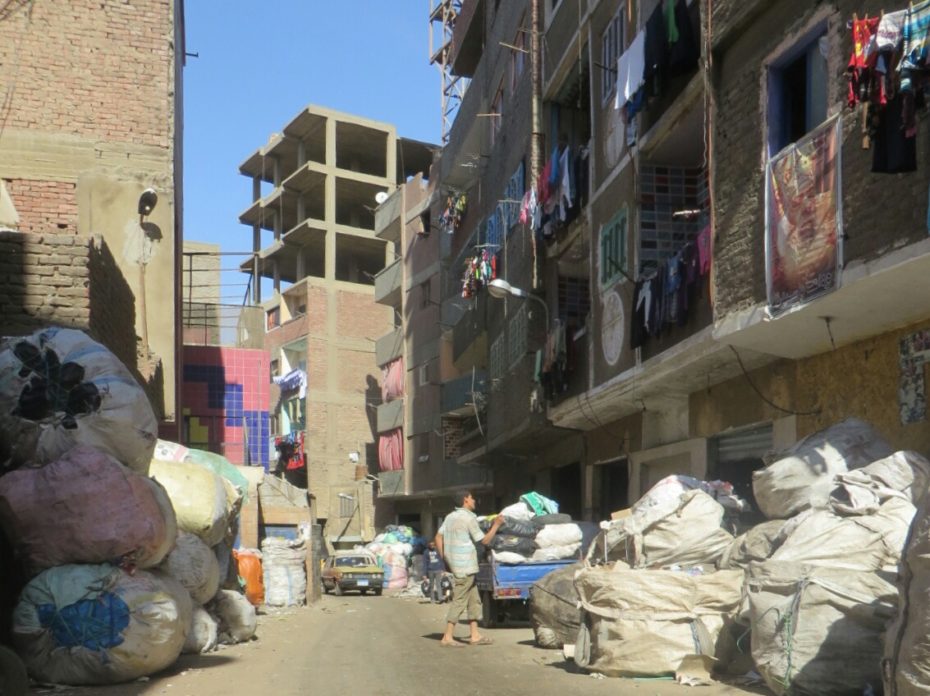
A typically idyllic street view
This predominantly Coptic, Christian part of Cairo has long been on the social margins of the city but this measure of disenfranchisement created a path, if not to riches but at least a modest, stable income. If there was one thing that the rest of Cairo has been abundant with it’s rubbish and so combined with the inhabitant’s reluctance to initiate its movement any further than the distance between their hands and whatever bit of street they are in, the Christians saw an opening. Decades before it was cool in the West to recycle, the Copts efficiently mopped up whatever they could find and sorted the wheat from the chaff or more likely these days, the plastic from the paper. With around an 85% recycling rate, these zabaaleen as they are known (the word deriving from the arabic for rubbish), give most western efforts at recycling a good run for their money. Textile scraps are made into bags, rugs and much more besides by enterprising women, while others turn waste paper into stationary. Families tend to specialise in certain materials, with the men generally doing the collecting and the women and children the sorting. A steady stream of overloaded pick ups and donkey carts keeps the whole system fed. Little surprise it has become known as Rubbish City.
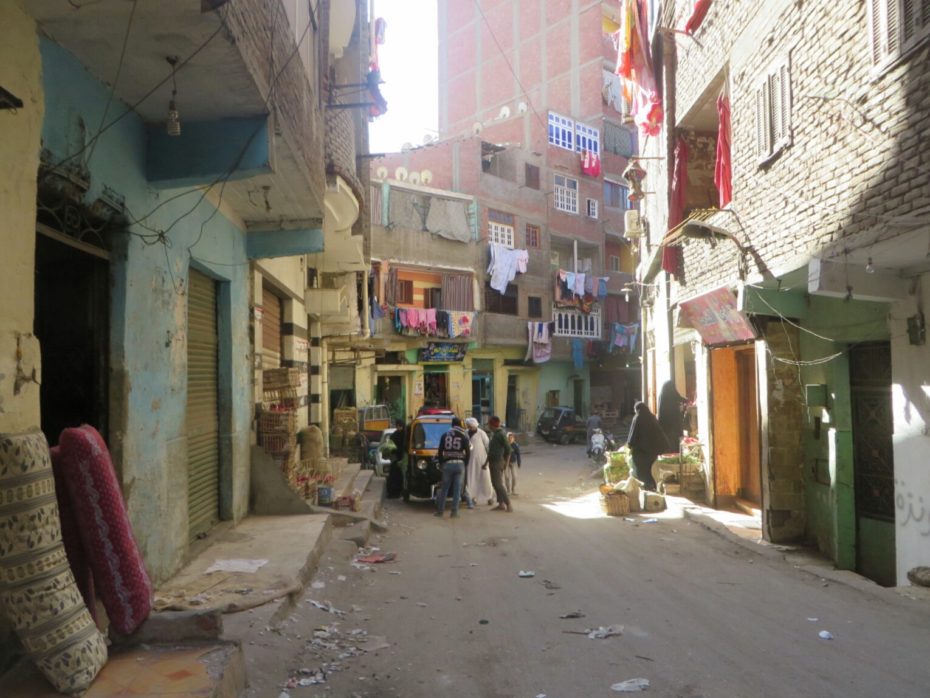
One of the charming quieter streets where they have opted for a lower level of rubbish storage
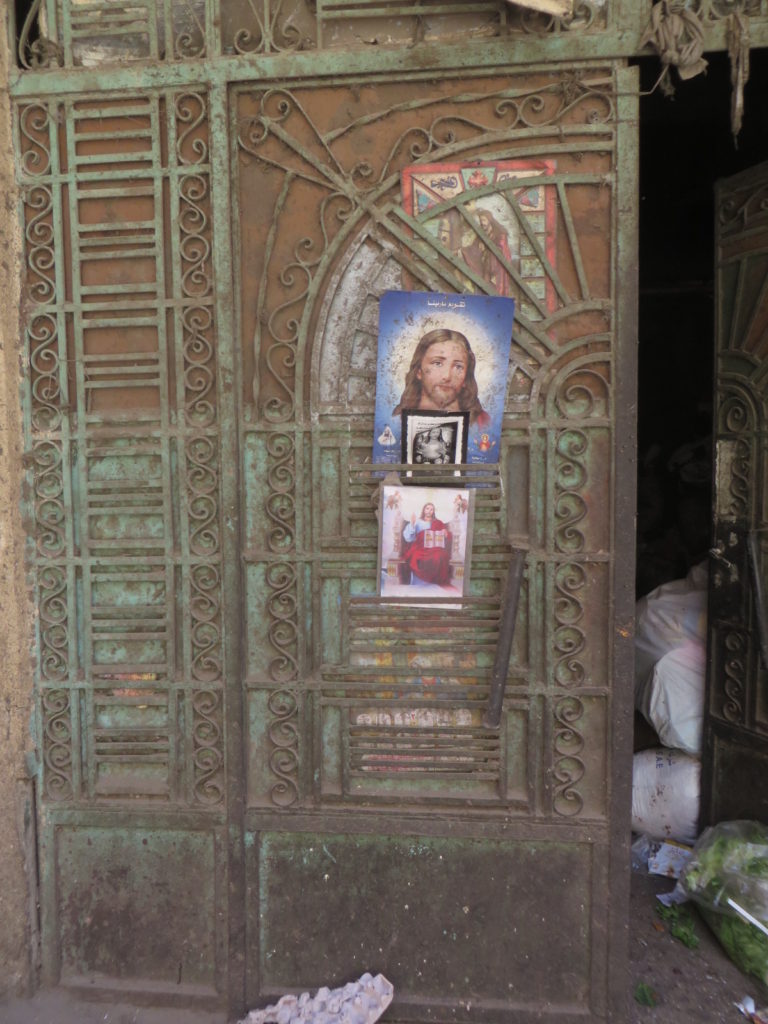
Lord of the flies
As the area has evolved rather unofficially over the years, the government hasn’t got around to providing sewage systems and running water everywhere, so as you can imagine I felt right at home. Given the limited facilities and all the rubbish coming, going and often staying quite a long time, the fly breeding programme has been a runaway success, though I don’t believe they have profited from the possibility of making fly burgers from them that have provided a tasty, nutritional boost to some poorer areas of Africa. Presumably for reasons of economies of scale, the recycled material is stored pretty much everywhere, from the pavements to the rooftops, awaiting the day when it can be shipped off to be sold or reprocessed.
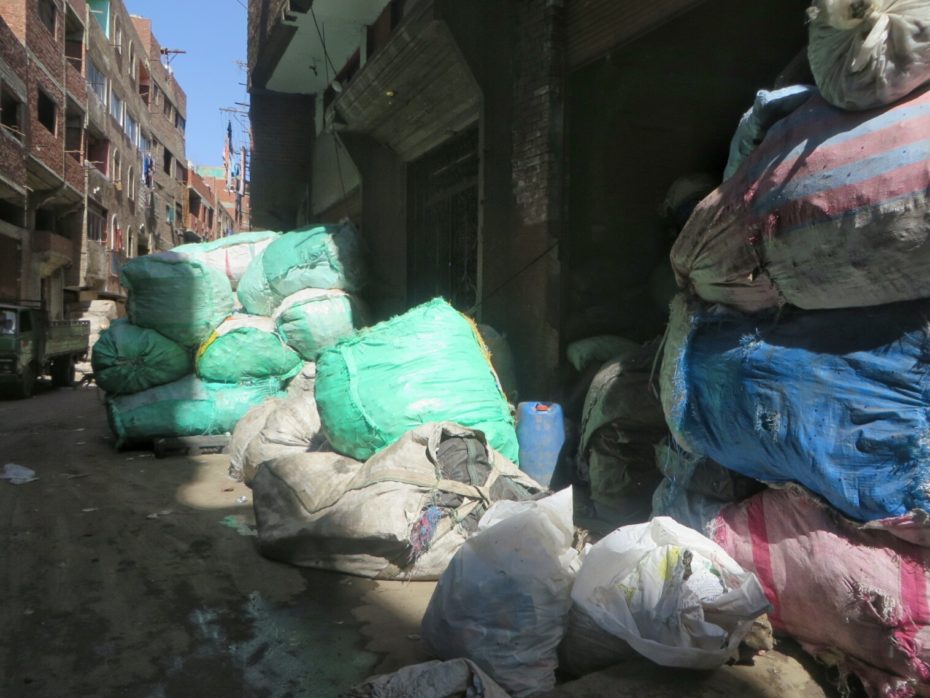
Street decorations
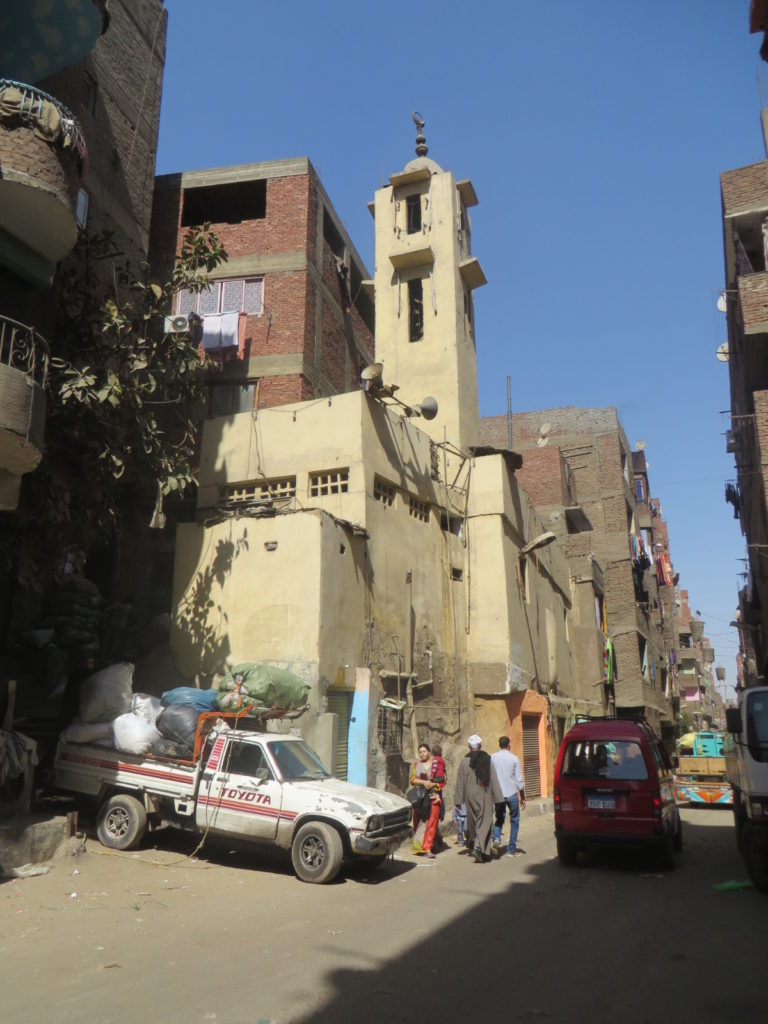
God and rubbish are never far apart in Manshiyat Naser
As is common in poorer areas throughout Egypt the ultra minimalist style of concrete framed, multi storey housing predominates, where externally and probably internally in some cases, absolutely nothing is done to interfere with the total absence of aesthetic considerations. Raw concrete and brick towers provide an ideal rough surface to attract the tonnage of dust blown in from the desert and compliment perfectly the huge stacks of recycled rubbish in greyish bags. Slightly ramshackle, wooden pigeon towers punch their way up amongst the harsh slabs of tower blocks. Once in a while on older buildings, the recessed balconies are splashed with a glorious technicolour of religious imagery, a blessed relief from much of the area that looks as though someone has adjusted the contrast and colour on your vision down to a bare minimum.
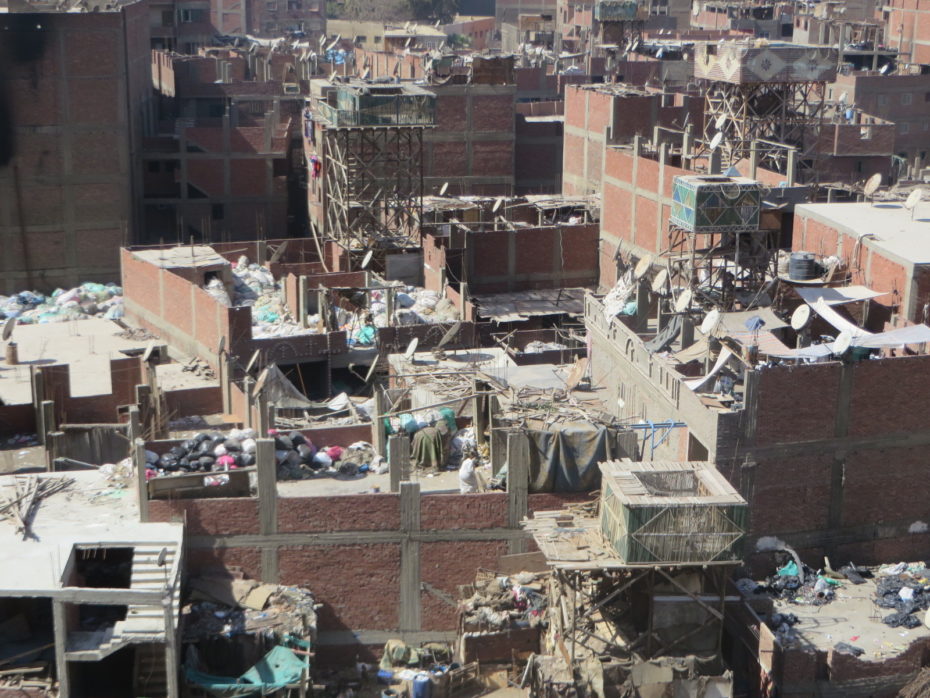
Rooftop balcony views
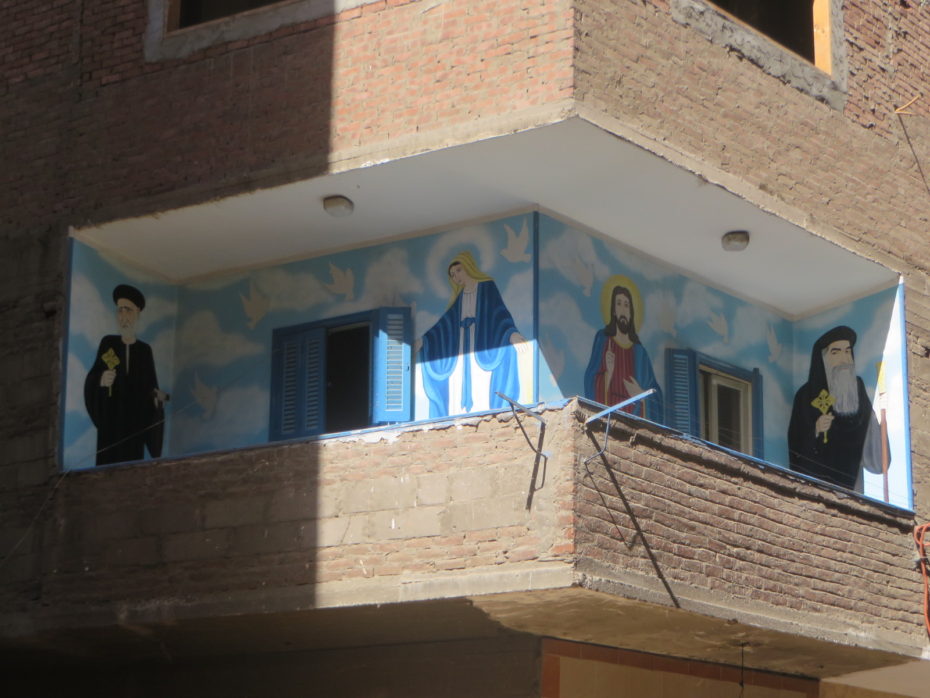
One of many brightly decorated balconies
One bold new addition is a huge graffiti work by a Tunisian artist, spanning numerous buildings but as fantastic as it is you can’t help wondering why there wasn’t a similar urge to spend money on improving some of the basic services. You can only appreciate the scale of the work from the route up to the church, which is half way up the rocky outcrop overlooking the city. Doubtless this haven of spirituality also provides blessed relief for the senses as it is the one bit of the area that isn’t festooned with waste, although the view permits you the glorious contemplation of its bounteous magnitude.
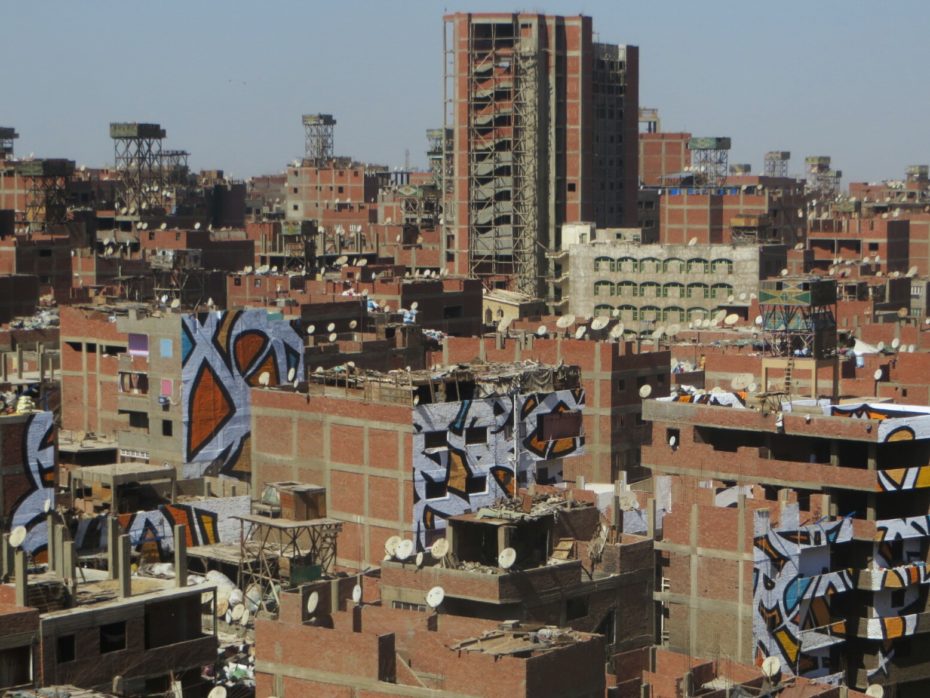
Art for art’s sake, sewage system for God’s sake!
As lunch was a tad overdue I took advantage of the next inevitable request to join some men for a cup of tea, an ideal accompaniment to whatever the spaghetti and hot dog based dish was that I had purchased. Our mutually minimal and haphazard linguistic abilities did little to inhibit the entertainment value of the conversation, although I did have to resort to saying yes when they asked if I was a Christian in order to avoid an explanation beyond the capacity of my arabic if I had just said no. (Dreadfully sorry about that God, I didn’t mean to take the piss as I know you have done a lot of good work in your time and it was one of those spur of the moment decisions. I won’t make a habit of it and will donate some money to something worthy to make up for it. Please send a sign to indicate the nature of the donation you would prefer) Like most conversations with Egyptian men in cafes they soon wanted to know my marital status, so trying to explain my lack of wife and kids at the age of 51 always results in the mention of sex, clearly the favourite subject matter of the Egyptian male. This did however, provoke one of the men to develop a repetitive interest in touching my knob. There are many occasions when a bit of knob touching may be regarded as a perfectly acceptable past time but call me old-fashioned if you will, in my personal opinion the middle of a cafe on a saturday afternoon isn’t one of them. The expressions on some of his friend’s faces after a while seemed to indicate that this was tiresomely usual behaviour so it seemed a good moment to shuffle off through the dust and debris to gracefully reject the forthcoming offers of tea.
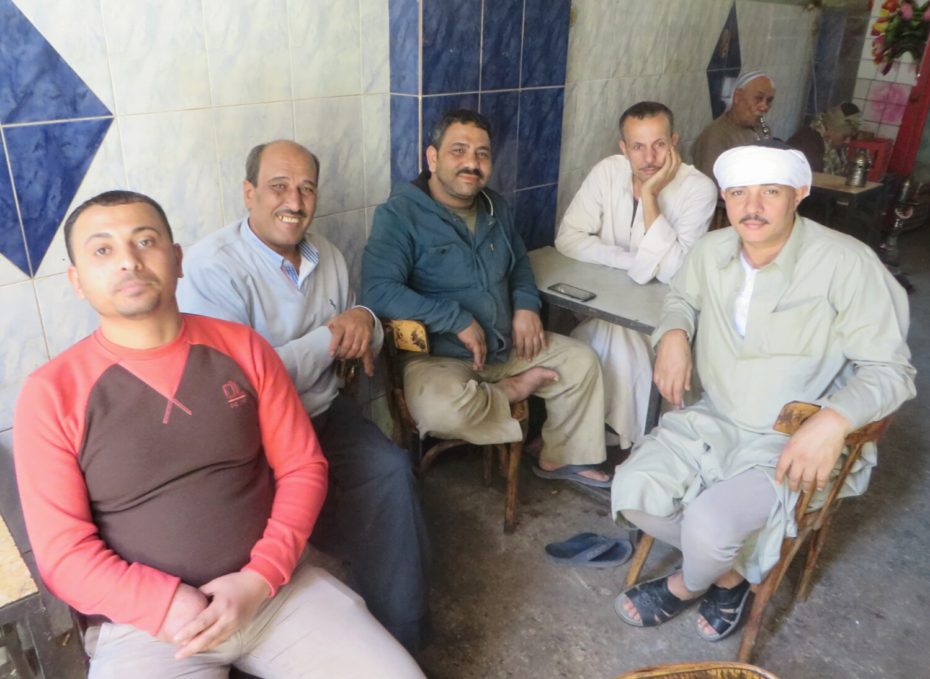
My tea drinking friends, Knob Toucher on the left




